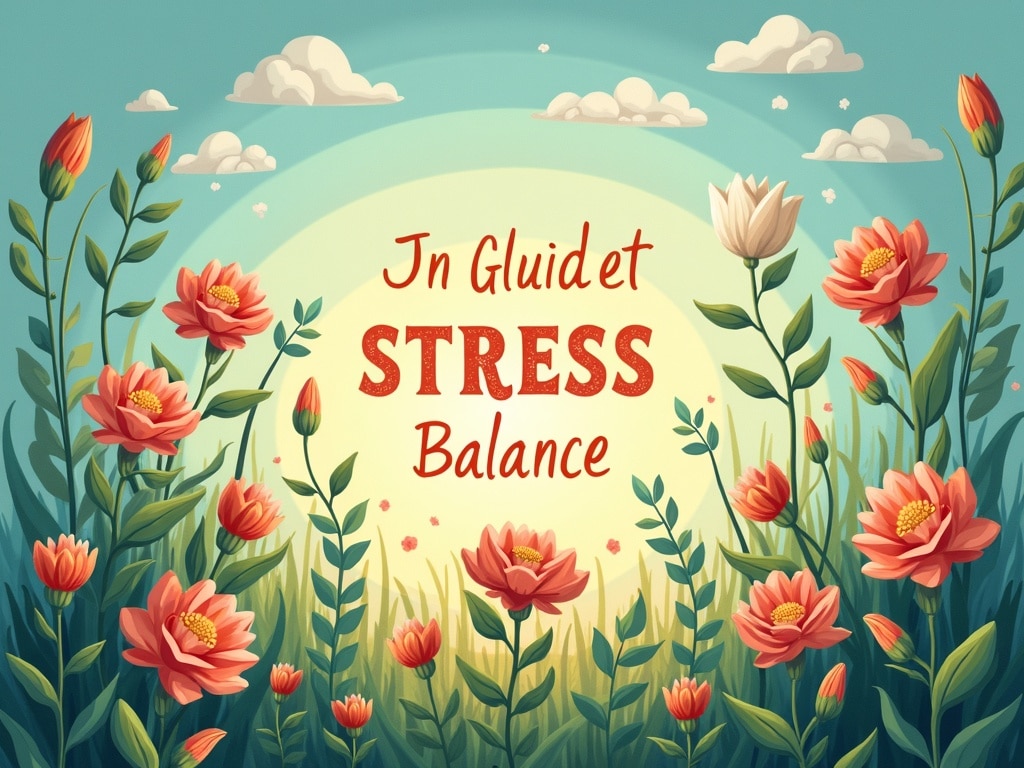How to Lower Cortisol Levels Naturally: Your Guide to Stress Balance
Imagine waking up feeling refreshed, not with that familiar knot of anxiety tightening in your stomach. Cortisol, the body's primary stress hormone, can be a helpful ally in short bursts, but when it's chronically elevated, it can wreak havoc on your health. From weight gain and sleep disturbances to weakened immunity and increased risk of chronic diseases, the consequences of high cortisol are far-reaching. The good news? You don't need a prescription to regain control. This guide will explore effective, natural strategies to lower cortisol levels and reclaim your well-being.
Understanding Cortisol and Its Impact
Cortisol is produced by the adrenal glands in response to stress. In a healthy individual, cortisol levels rise in the morning, providing a natural wake-up boost, and gradually decline throughout the day, reaching their lowest point at night. This natural rhythm is crucial for regulating various bodily functions, including:
- Blood sugar levels: Cortisol helps maintain stable blood sugar by releasing stored glucose.
- Metabolism: It influences how your body uses carbohydrates, fats, and proteins.
- Immune function: While cortisol can initially suppress inflammation, chronic elevation weakens the immune system.
- Blood pressure: Cortisol helps regulate blood pressure and cardiovascular function.
- Sleep-wake cycle: The natural rise and fall of cortisol are essential for regulating sleep patterns.
When stress becomes chronic, the adrenal glands are constantly signaled to produce cortisol, disrupting the natural rhythm and leading to consistently high levels. This chronic elevation can contribute to a range of health problems.
The Symptoms of High Cortisol
Recognizing the signs of high cortisol is the first step towards addressing it. Common symptoms include:
- Weight gain, particularly around the abdomen
- Difficulty sleeping or insomnia
- Fatigue and low energy levels
- Anxiety and irritability
- Brain fog and difficulty concentrating
- High blood pressure
- Muscle weakness
- Increased thirst and urination
- Acne or skin problems
- Decreased libido
If you experience several of these symptoms, it's worth exploring strategies to lower your cortisol levels naturally.
Lifestyle Adjustments for Lowering Cortisol
The foundation of lowering cortisol lies in adopting sustainable lifestyle changes that reduce stress and support healthy hormone balance.
Prioritize Sleep
Sleep deprivation is a major trigger for cortisol release. Aim for 7-9 hours of quality sleep each night. Here's how to optimize your sleep environment:
- Establish a consistent sleep schedule: Go to bed and wake up around the same time each day, even on weekends.
- Create a relaxing bedtime routine: Wind down with a warm bath, reading, or gentle stretching.
- Optimize your sleep environment: Make sure your bedroom is dark, quiet, and cool.
- Avoid screens before bed: The blue light emitted from electronic devices can interfere with melatonin production and disrupt sleep.
- Limit caffeine and alcohol intake: These substances can disrupt sleep patterns.
Manage Stress with Mindfulness and Meditation
Mindfulness practices, such as meditation and deep breathing exercises, can effectively reduce cortisol levels by promoting relaxation and reducing the body's stress response.
- Meditation: Even a few minutes of daily meditation can significantly lower cortisol. Explore guided meditations or simply focus on your breath.
- Deep breathing exercises: Practice diaphragmatic breathing to activate the parasympathetic nervous system, which promotes relaxation.
- Yoga and tai chi: These practices combine physical movement with mindfulness, further reducing stress and improving overall well-being.
- Spend time in nature: Studies show that spending time outdoors can lower cortisol levels and improve mood.
Exercise Regularly – But Moderately
Regular physical activity is beneficial for overall health and can help manage stress. However, it's crucial to find a balance. Excessive or intense exercise can actually increase cortisol levels, especially if you're already under stress.
- Choose activities you enjoy: This will make it more likely that you'll stick with your exercise routine.
- Opt for moderate-intensity exercise: Activities like brisk walking, swimming, or cycling are good choices.
- Avoid overtraining: Listen to your body and rest when you need to.
- Incorporate restorative activities: Balance your workouts with activities like yoga, stretching, or massage.
Nourish Your Body with a Balanced Diet
What you eat plays a significant role in hormone regulation, including cortisol. A balanced diet that supports stable blood sugar and provides essential nutrients is crucial.
- Eat regular meals: Skipping meals can lead to fluctuations in blood sugar, which can trigger cortisol release.
- Focus on whole, unprocessed foods: These foods provide essential nutrients and help stabilize blood sugar.
- Include plenty of fruits and vegetables: These are rich in antioxidants, which can help protect against the damaging effects of stress.
- Choose healthy fats: Omega-3 fatty acids, found in fatty fish, flaxseeds, and walnuts, have been shown to lower cortisol levels.
- Limit sugar and processed foods: These can contribute to inflammation and blood sugar imbalances, both of which can increase cortisol.

The Role of Nutrition in Lowering Cortisol
Beyond general dietary guidelines, certain nutrients and foods have been specifically linked to cortisol reduction.
Foods and Nutrients to Embrace
**Phosphatidylserine:This phospholipid can blunt cortisol response to stress. It’s found in soy lecithin and can be taken as a supplement.
**Omega-3 Fatty Acids**: As mentioned, these support overall health and help modulate the stress response.
**Magnesium-Rich Foods**: Magnesium is a natural stress reliever. Include foods like spinach, dark chocolate, and avocados in your diet.
**Probiotic-Rich Foods**: Gut health is closely linked to stress levels. Incorporating fermented foods like yogurt, kefir, and sauerkraut can improve gut health and indirectly reduce cortisol.
**Dark Chocolate (in moderation):The flavonoids in dark chocolate can help lower cortisol levels and improve mood, but moderation is key due to its sugar and caffeine content.
Foods to Limit or Avoid
**Excessive Caffeine**: While a little caffeine can be stimulating, too much can raise cortisol levels.
**Excessive Alcohol:Alcohol can disrupt sleep and increase cortisol production.
**Processed Foods**: These often contain high levels of sugar, unhealthy fats, and additives, all of which can contribute to inflammation and increased cortisol.
Supplements for Cortisol Management
While lifestyle and dietary changes are the cornerstone of cortisol management, certain supplements can provide additional support. Always consult with a healthcare professional before starting any new supplement regimen.
Popular Supplement Options
- Ashwagandha: This adaptogenic herb has been shown to reduce cortisol levels and improve stress resilience.
- Rhodiola Rosea: Another adaptogen, Rhodiola, can help the body adapt to stress and reduce fatigue.
- Magnesium: This mineral plays a crucial role in stress regulation and can help improve sleep quality.
- L-Theanine: Found in green tea, L-theanine promotes relaxation without causing drowsiness.
- Phosphatidylserine: As mentioned earlier, this supplement can help blunt the cortisol response to stress.
Important Considerations
- Quality matters: Choose supplements from reputable brands that undergo third-party testing for purity and potency.
- Dosage: Follow recommended dosages and consult with a healthcare professional to determine the appropriate dose for you.
- Potential interactions: Be aware of potential interactions between supplements and medications you may be taking.
- Not a quick fix: Supplements are most effective when combined with lifestyle and dietary changes.
Creating a Personalized Cortisol- Lowering Plan
Lowering cortisol levels is not a one-size-fits-all approach. What works for one person may not work for another. It's essential to create a personalized plan that takes into account your individual needs, lifestyle, and stress triggers.
Steps to Personalization
- Identify your stress triggers: Keep a journal to track situations, events, or thoughts that trigger stress.
- Assess your lifestyle: Evaluate your sleep habits, diet, exercise routine, and overall stress management strategies.
- Set realistic goals: Start with small, achievable changes and gradually build from there.
- Experiment with different techniques: Try different stress management techniques, such as meditation, yoga, or spending time in nature, to see what works best for you.
- Track your progress: Monitor your symptoms and cortisol levels (if possible) to track your progress and make adjustments as needed.
- Seek professional guidance: Consult with a healthcare professional, therapist, or nutritionist for personalized advice and support.
Long-Term Strategies for Sustainable Stress Management
Lowering cortisol is not just about addressing immediate symptoms; it's about building long-term resilience to stress and promoting overall well-being.
Building Resilience
**Cultivate strong social connections:Spend time with loved ones, join a support group, or volunteer in your community. Social support can buffer against the negative effects of stress.
**Practice gratitude**: Regularly acknowledge the good things in your life. Gratitude can shift your focus away from stressors and promote positive emotions.
**Set boundaries:Learn to say no to commitments that drain your energy or add unnecessary stress to your life.
**Engage in hobbies and activities you enjoy:Make time for activities that bring you joy and relaxation.
**Develop healthy coping mechanisms:Identify healthy ways to cope with stress, such as exercise, mindfulness, or spending time in nature.
When to Seek Professional Help
While natural strategies can be effective for managing cortisol levels, it's essential to seek professional help if you're experiencing significant symptoms or if your stress is impacting your daily life. A healthcare professional can help you determine the underlying cause of your high cortisol and recommend appropriate treatment options, which may include medication, therapy, or other interventions.
Lowering cortisol levels naturally is a journey, not a destination. By incorporating these strategies into your daily life, you can regain control over your stress response, improve your overall health, and create a more balanced and fulfilling life. Remember to be patient with yourself, celebrate your progress, and seek support when you need it. Your well-being is worth the effort.
